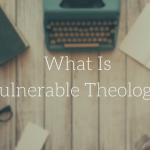I owe a huge thanks to the staff of the Criswell Theological Review (particularly Brandon Smith and Everett Berry) for publishing an article of mine on Van Til’s covenant theology. (Summary: Read my new article here).
The first half of the article serves to differentiate three theologians: Karl Barth, Hans Urs von Balthasar, and Cornelius Van Til himself, on issues of the theological nature of history, and the relationship between historical particulars and trinitarian theology (i.e. how they inform one another). The second half gets a bit controversial. Essentially, I try to explain the relationship, for Van Til, between the redemptive event of the pactum salutis (covenant of redemption) among the three persons of the Trinity (the first event in God’s first-order decree and a second-order particular of contingent history itself) and the event of the Fall (unavoidable, at both the decretal level and the human level). That is, for Van Til, the prelapse was structurally and metaphysically conducive to the single end of redemptive history—and yet, the prelapse itself was not on occasion for grace.
Following Kline, Adam did not receive grace before the Fall. And yet, in Van Til, it is the pactum salutis that gives the pre-redemptive state of affairs their meaning. The principle that founds and orders the prelapsarian state of affairs is redemptive in content and purpose. Again, this does not entail that Adam received redemptive benefits, but only that success in probation—victory in battle against the serpent—while offered to him, was not within his grasp. If Adam had succeeded at probation, the pactum would have been undone, and Eden itself would not have existed. Adam not sinning is as possible as Christ sinning. Each would undo the the order and rationale of history itself. In principle, Christ could sin insofar as he had genuine human agency. Likewise for Adam. And yet, these possibilities belong to a unique class of contingent possibilities which, having gone another way (Adam succeeding; Christ failing) would only obtain in a world which would be unintelligible to us. The most basic principle of created metaphysics, epistemology, and ethics for Van Til was the redemptive principle established before the foundation of the world. “Before the foundation of the world” is not merely decretal, but historical also.
I’m mainly writing for my WTS people: To the extent that the pactum is a historical event (second-order, as well as first-order), the Fall is unavoidable. The Fall is not comparable to any other historical particular, except perhaps the sinless life of Christ, as we have mentioned. Perhaps, like other elements of his theology, Van Til left work to do in this area. And yet, it seems to me in my reading of him that he is wrestling with this tension, and at times insists that the overarching and inevitable redemptive principle is operating in Eden.
I don’t think most Van Tillians will be able to hear this. There will be a knee-jerk. But I think it’s unavoidably a part of his theology. And there is not a clear alternative answer. I have not heard a satisfying explanation of the relationship between the pactum, considered as a second-order, redemptive, historical event (which it is) and subsequent event of the innocent, non-gracious prelapsarian order. Perhaps the answer lies somewhere in there being more complexity and hierarchy among contingent necessities (like logic, shapes, exemplars, and the redemptive principle) than we might think. Where do we draw the lines separating various kinds of contingent necessities? The pactum (the redemptive principle), in terms of Klinean theology, would seem to go at the end – as most dispensible, theoretically in the broad scope of covenant history. And yet, in terms of divine condescension and for Van Til, the redemptive principle is the most basic and foundational principle, in terms of his theology of the pactum.
The main problem this causes: it makes God the author of sin. I’ll let that dangle, I guess. Enjoy the article. 🙂











